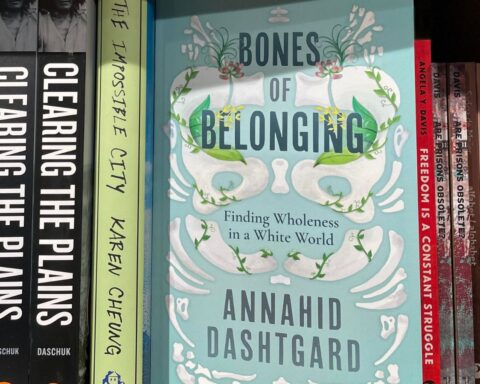There are touchstones in Tom Mulcair’s life, events that come full circle.
When he first ran for the Quebec legislature in the suburban Laval seat of Chomedey in 1994, he was returning to the neighbourhood where he grew up.
“On my first day of door-knocking,” he wrote in his new autobiography, Strength of Conviction, “I went back and walked my old Gazette delivery route!”
When he launched the French and English versions of the book in Montreal Monday evening, he chose a bar called Les Bobards on St. Laurent Blvd., in the Plateau Mont-Royal, where he had held his victory party in 2007 when he won the federal by-election in Outremont. Once again, full circle.
The joint was jumping, crowded with the personal and professional contacts of a lifetime — friends from his youth in suburban Montreal, colleagues from McGill Law School, staffers from the National Assembly who are with him still as Opposition leader in Ottawa.
“One thing that stands out about Tom is his loyalty to his friends.” – Geoff Chambers
Geoff Chambers, for example, has known Mulcair since they worked together at Alliance Quebec, the minority English-language activist group, back in 1983.
Chambers was sitting at the bar with his uncle, Charles Taylor — McGill professor, co-author of Quebec’s landmark 2008 report on reasonable accommodation of ethnic minorities, and lifetime NDP activist. Chuck Taylor famously ran and lost to a guy named Pierre Trudeau in Mount Royal back in 1965. His role at Les Bobards was to introduce Mulcair.
“One thing that stands out about Tom,” said Chambers, “is his loyalty to his friends.”
Humble beginnings
It probably begins with family. Mulcair was the second oldest of 10 kids in a rambunctious and roaring Irish-Catholic family, the big brother to eight siblings. “In a large family,” he wrote, “as anyone who was raised in one can attest, you learn to take your responsibilities early. The older children help to bring up the younger ones.”
His parents’ struggles to make ends meet can only be imagined. Mulcair’s father had attended Loyola, a Jesuit high school for boys, and his son easily passed the entrance exam. But here there was no full circle — his father informed him the family couldn’t afford the tuition, then less than $1,000 per year.
(My family couldn’t afford it either — but then I was only the second of two children, not the second of 10.)
[Mulcair and his wife’s] backgrounds could not have been more different — he came from a struggling Irish-Catholic family, she from an affluent Jewish family from the well-to-do Paris neighbourhood of Neuilly. Her people, originally from Turkey, were Sephardic Jews and Holocaust survivors.
When he was 10 and 12 years old, Mulcair had paper routes with the Montreal Star and The Gazette. As a 14-year old high school student at Laval Catholic, Mulcair worked a summer job for $1.25 an hour at a clothing factory in Montreal’s schmatte district.
This also came full circle on Monday, in a way; the schmatte guys have lunch at Schwartz’s and dinner at Moishe’s, just a few blocks south of les Bobards on St-Laurent. Over smoked meat at lunch and steaks at dinner they can be overheard complaining about their costs — including the help.
As a student at McGill, Mulcair paid his way through law school by working summers in the construction industry, tarring roofs. Just the way to get through a hot Montreal summer.
After completing his first year of law, in the summer of 1974, he met a French girl from Paris at a friend’s wedding. Mulcair and Catherine Pinhas have been together ever since. Their backgrounds could not have been more different — he came from a struggling Irish-Catholic family, she from an affluent Jewish family from the well-to-do Paris neighbourhood of Neuilly. Her people, originally from Turkey, were Sephardic Jews and Holocaust survivors. The couple has two sons, both graduates of McGill, one a cop and the other a college professor.
Campaign plugs and some omissions
Two things stand about the first half of Mulcair’s book. One is that it’s completely authentic, an account not only of his formative years but of a vanished place and time — English-Catholic Montreal in the middle of the 20th century.
The other is that Mulcair obviously wrote it himself, because the voice is entirely his. He wrote on his BlackBerry, on planes, trains and automobiles. (Quite an endorsement of the BlackBerry keyboard. I’ve written columns on mine, but a book? That might be a first.)
It’s only when Mulcair moves on to talk about his party leadership that his book turns into a campaign pamphlet, with the usual pre-election posturing and positioning.
Mulcair also tells a compelling story about his years in Quebec City and his eventual recruitment by Jack Layton and the NDP. It didn’t end well between Mulcair and Jean Charest in Quebec. As Environment and Parks minister in 2006, Mulcair opposed the development of Mont-Orford Park in Charest’s backyard in the Eastern Townships. Charest called him in and the two men had a conversation that went something like this: You’re demoted. No, I quit. In the end, no development ever went ahead.
Months later, Mulcair and Catherine had dinner with Layton and Olivia Chow at Mon Village, in Hudson, where Layton grew up. The restaurant is a well-known stop on the road between Montreal and Ottawa and — full circle again — it was there that Mulcair met Layton’s former principal secretary, Brad Lavigne, and persuaded him to return as his senior campaign adviser.
It’s only when Mulcair moves on to talk about his party leadership that his book turns into a campaign pamphlet, with the usual pre-election posturing and positioning. For example, in a chapter on the 1995 Quebec referendum, there’s a conspicuous insert on the NDP’s 2005 Sherbrooke Declaration and Mulcair’s support of a 50 + 1 Yes vote being enough to break up the country.
“One of the worst mistakes we can make is to deceive the voters that in voting Yes they are voting for something else,” he writes. “Some say it would be unthinkable to let the country break up on a vote of 50 per cent + 1 … I say it would be unconscionable to let our relationships as Canadians degenerate that far.”
[H]e wasn’t improvising or thinking out loud over St.-Jean-Baptiste, when he said he was “proud” of the Sherbrooke Declaration. It’s in his book.
So, he wasn’t improvising or thinking out loud over St.-Jean-Baptiste, when he said he was “proud” of the Sherbrooke Declaration. It’s in his book. And while this position might help Mulcair on the margins with the soft nationalist vote in Quebec, it will hurt the NDP in the rest of Canada, where there is very little support for the idea of repealing the 2000 Clarity Act requiring a clear majority to a clear question.
And there are omissions. There is a reference to former Laval Mayor Gilles Vaillancourt pushing building developments harmful to the environment. Having raised this, Mulcair passed on the opportunity to recount how Vaillancourt once offered him a mysterious envelope — a suspected bribe, which Mulcair refused.
He also wrote about how, when he left the Charest government, “the Conservatives came calling.” He mentioned “a senior Conservative who was an old friend from Quebec City.” This would have been Lawrence Cannon, then the senior Quebec political minister in the Harper government. They met at the Garrison Club in Quebec City, and Cannon was interested in Mulcair joining the Conservatives as a candidate.
Mulcair wrote that he was more interested at the time in becoming chair of the National Round Table on the Environment and the Economy (NRTEE). “I had put forward my name and had been short-listed to head the agency.”
Had the Conservatives appointed him to head the NRTEE — had they not shut it down two years ago, Mulcair never would have become NDP leader. He never would have become leader of the Official Opposition. And Stephen Harper would not now be trailing him in most polls. Full circle.
L. Ian MacDonald is editor of Policy, the bi-monthly magazine of Canadian politics and public policy. He is the author of five books. He served as chief speechwriter to Prime Minister Brian Mulroney from 1985-88, and later as head of the public affairs division of the Canadian Embassy in Washington from 1992-94. The views, opinions and positions expressed by all iPolitics columnists and contributors are the author’s alone. They do not inherently or expressly reflect the views, opinions and/or positions of iPolitics.
Published in partnership with iPolitics.ca.





